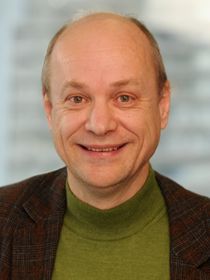To prevent or mitigate the worst consequences human-induced disruption imposes upon the climate system, a paradigm shift is called for: a "Great Transformation" leading to a post-fossil economy and societal transformation. The first seminar in the series takes a look at the future of transport in urban areas, with a joint invitation from the Research Lab Democracy and Society in Transition and Vienna's Kardinal König Haus on 3 March 2022.
Currently, major challenges are dominating the news, some of which are intertwined: from pandemics to climate change, extinction of species, chemical pollution, and global social inequality. A change of paradigm is necessary to effectively address this situation, including energy, industrial production, mobility, construction and housing, food, agriculture and land use, and waste management. Since the coal-based industrial revolution in the 18th century, this greatest structural change worldwide has been taking place under great time pressure in order to avert or mitigate the worst consequences of the human-made disruption of the climate system and ecosystems.
Experts and stakeholders will exchange their views on various aspects of the socio-ecological transformation in the "Academy of Transformation" seminar series. This contributes to a better understanding of the complexity and multidimensionality of transformation processes. Finally, it is about encouraging people to contribute to these changes actively and constructively towards sustainability, quality of life and justice.
Vienna's mobility reimagined
The kick-off seminar deals with the current conflicts around the traffic turnaround in Vienna. The cancellation of some road construction projects like the Lobau tunnel by the Ministry of Climate Protection shows how challenging it is to implement such a paradigm shift. Moving away from decades in which cars were at the center of everything towards a people-centered city runs up against resistance from existing structures and habits.
In her introductory lecture Barbara Laa, Institute of Transport Sciences, Research Department Traffic Planning and Traffic Engineering, TU Wien, will discuss "Transformation conflicts around the traffic turnaround using the example of Vienna". In the panel discussion that will follow, Prof emeritus Hermann Knoflacher, Transport Scientist, TU Wien; Thomas Madreiter, Planning Director, Municipal Directorate of the City of Vienna; Hans-Jürgen Salmhofer, Head of the Mobility Transition Department, Ministry of Climate action, Section II "Mobility"; and Lena Schilling, Founder of the Youth Council and Spokesperson of the "Lobau bleibt" initiative, will share their opinions and insights. Ernst Fürlinger, University for Continuing Education Krems will moderate the discussion.
Prof Andreas Knie, Professor of Sociology at TU Berlin, will open the afternoon session with his presentation "Transformation of Mobility as a Central Element of the Socio-Ecological Turnaround", to be followed by the presentation of the initiative "Platz für Wien" by Ulrich Leth, TU Wien, Department of Transport Planning, and political scientist Rainer Stummer.
Prof Andreas Knie, Professor of Sociology at TU Berlin, will open the afternoon session with his presentation "Transformation of Mobility as a Central Element of the Socio-Ecological Turnaround", to be followed by the presentation of the initiative "Platz für Wien" by Ulrich Leth, TU Wien, Department of Transport Planning, and political scientist Rainer Stummer.
The follow-up seminar will again be held at the Kardinal König Haus in Vienna on 27 May 2022. Kriemhild Büchel-Kapeller, Büro für Freiwilliges Engagement und Beteiligung (Office for Voluntary Engagement and Participation) of the State of Vorarlberg, will deal with "Participation as a Key for Transformation".
"Academy of Transformation" Seminar Series
The future of urban transport in a climate emergency
Date: 3 March 2022
Start: 9:30am - 5:30pm
Location: Kardinal König Haus, Kardinal-König-Platz 3, 1130 Vienna, Austria
The number of participants for the classroom seminar is limited, online participation is also possible.
Contact

PD Mag. Dr. Ernst Fürlinger
wissenschaftlicher Mitarbeiter - Research Lab Democracy and Society in Transition
-
ernst.fuerlinger@donau-uni.ac.at
-
+43 (0) 699 10 46 11 25
- Universität für Weiterbildung Krems
- Research Lab Democracy and Society in Transition
- Dr.-Karl-Dorrek-Straße 30
- 3500 Krems
- Österreich
Tags